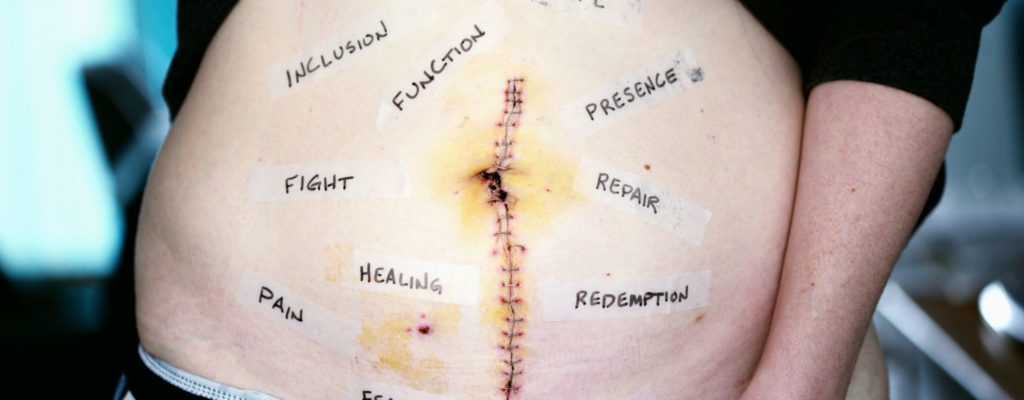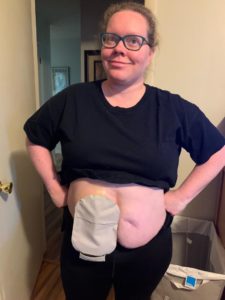Coping | IBD | Ostomy


Ashley showing her ostomy pride!
I have had some sort of ileostomy since 2011. I know the really good and the really bad that can come from having one. I’m a Crohnie, diagnosed in 2012, but my symptoms started in March of 2011 after a run in with C. Diff. that put me in a coma and almost killed me. It also jump-started the autoimmune disease.
I had my permanent ostomy placed in October of 2019, and I was really scared. This was “No looking back, jump with both feet, into the unknown!” territory for me.
My first ostomy, in 2011, was brief, 4 months, barely a blip in time, but a wicked scar and a cool story about almost dying. Though 2014 brought challenges, I developed contact dermatitis to the bags. My skin was falling off in ribbons, constantly damp, so nothing stuck to it, multiple leaks a day, multiple bag changes a day, it was a LOT. Hopefully, you can see my apprehension to an elective proctectomy, though it would prove life changing.
Late 2018, the biologic I was on failed me, and in the mad dash to find another that worked, came prednisone. Then I failed the next biologic, and my medical team started to panic a bit. The possibility of a permanent ostomy started to come in whispers, and then as plausible ideas. By the time I had the surgery in October, I had spent 13 separate weeks in the hospital, was on TPN and pretty much bed (and toilet)-bound. I was rushed to the hospital via ambulance twice. Did I mention that I had multiple rectovaginal fistulas, to boot?
It was no way to live, and honestly I wouldn’t exactly call “giving yourself a black eye on the toilet because your blood pressure dropped too much from standing up to flush too fast that you passed out and hit your eye on the toilet” living at 34 years old. I agreed to the surgery; my surgeon even moved it up. I think he was more excited than I was to do it.
When I first got sick in 2011, I was going to school to become a medical assistant. I knew of Crohn’s, but not really a lot about it. I didn’t know anyone with it. I knew what an ostomy was, but the idea kind of grossed me out. I woke up from a coma not knowing I had one, until the ostomy nurse came in and told me. It was a jarring way to discover you have one, but it was probably best I found out with strangers. I would have been much more emotional had it not been.
I wonder why that is, and I can narrow it down to a few things. One is that poop is gross and a bit taboo in culture, and its front and center and coming out of where it “naturally” shouldn’t. Another is that because of the sensitive nature of it, it’s not talked about often, and when it is-not accurately, especially in the media. Do you know how many times my family and friends who have been amazing support for me through my journey and have been in with doctors and nurses and myself call it a colostomy bag? I don’t have a colon to connect anything to. The media representations, that horrific episode of 9-1-1 where the guy with the colostomy bag has a blockage and ends up choking on his own feces? That’s not how bodies work. Then there was the patient, played by Mandy Moore, who goes in for an ostomy reversal and dies of unknown causes on Grey’s Anatomy. Gives us a lot of hope.
That’s not to say that there have not been positives along the way! In 2018, Aerie Beauty included Gaylyn Henderson in their fall bra campaign, with her ileostomy bag. She went on to have a piece in Elle in 2021, dictating the procedure to remove her colon at 21, and how she went on to become a model after that. In 2019, the world got news that Brazil’s President Jair Bolsonaro was having his colostomy reversed, after he was stabbed in the stomach four months prior on the campaign trail. Although, according to some news outlets, just removing the bag took nine hours, while reversing the colostomy itself took nine hours. No one ever said that the media had to be medically accurate.
Which brings me to the big question of why? The general public knows more about Autism Spectrum Disorder now more than ever before because of television shows like Parenthood, Atypical, The Good Doctor, The Big Bang Theory, and even Sesame Street to name a few. These shows put relatable characters into our living rooms and streaming devices at a time where learning more about something is a Google search away. So why then, do writers and reporters get this diagnosis and these diseases so wrong? Is it the ick factor alone? The complexity that is, especially women, with a Barbie Butt or an irreversible placement, against the stereotype of what femininity is onto a screen? We make little waves in print ads, then disappear again behind a screen to say our piece. I say no more.
This is going to take a large part of our numbers, but I have faith. It’s going to be crop top season again in a few short months. Bikini season will be here too. We are warriors, survivors when our body tried to take us out, we said “Not today!” Let’s show off the scars, the bags, the stretch marks, the signs of life that continue to flow through us daily.
I’m writing this at the beginning of Autumn, giving every woman plenty of notice-be proud. You are still here, I am PROUD of you for fighting so hard. Some days are harder than others, and will be harder than those in the future, but the good days are worth the fight. If for some reason, you can’t do the showing off bit, speak proudly of your stoma, and often. It’s keeping you alive, and that is worth its full weight in gold! I want this to be something we can correct people on with confidence and respect and medical accuracy-you never know who’s writing the next think piece or script for a new show!
